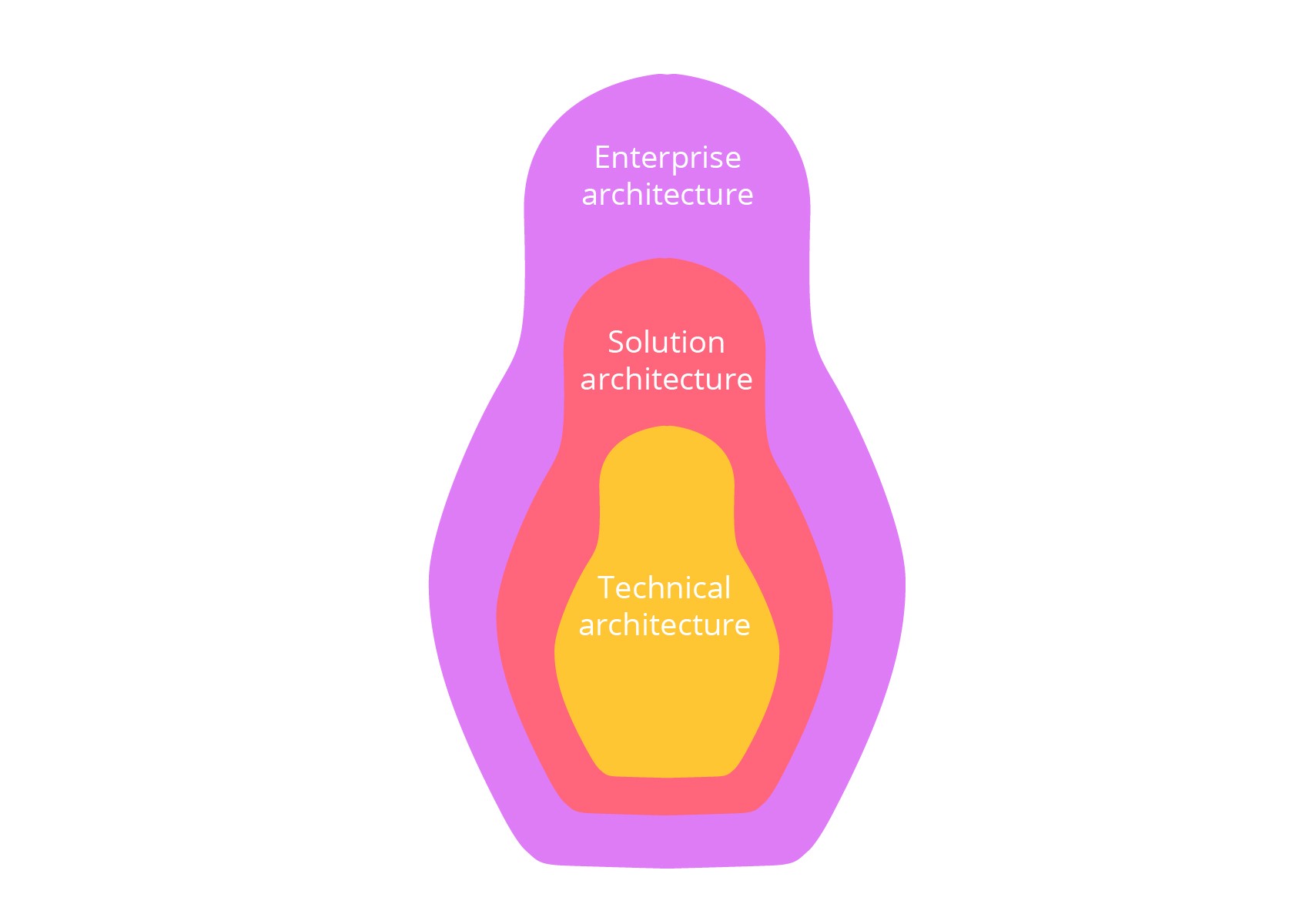
In a quickly changing IT world, companies need to change their modus operandi to meet their current business needs. This digital makeover calls for a particular expertise and knowing how to re-adjust business interests with IT solutions.
Solution architecture is a launching pad for any IT company. In this article, we?ll be discussing the role of a solution architect and the specific skills that such a position entails.

Enterprise Architect & Technical Architect Vs. Solution Architect
First of all, let?s define the notions of solution architecture and solution architect.
Solution architecture is a process of tailoring software engineering to meet specific business needs.
An enterprise architect hones in on constructing complex enterprise eco-systems and is focused on solving high-level technical problems. Enterprise architecture is characterized by strategies of the business structure (architecture) while providing a better handle on what technical aspects are needed to uphold the architecture.
A solution architect is responsible for all broad-brush technical strategy for a unique product. Solution architecture is a complex process with many stages covering a wide range of issues geared toward addressing particular business problems. This includes:
- Searching for the optimal technical knowhow to address specific types of business issues.
- Delineating how project stakeholders relate to the structure and features of particular software.
- Specifying the solution?s functional requirements and the necessary stages for its implementation.
- Preparing specifications that set the boundaries for the solution?s parameters and its final delivery.

A technical architect chiefly supervises software architecture and technical engineering. One way to depict the interactions between all three architectures would be to imagine a matryoshka doll:

Solution architecture helps visualize how different aspects of information and business and technology structures can be applied toward a particular solution. Solution architecture concentrates more on IT technologies to solve a specific business riddle, and as such, creates a conduit between enterprise structure and technical structure. The latter is mostly occupied with technical issues. It?s generally best when companies blend enterprise architecture operations with tech architecture activities working closely on a certain project.

Solution Architect Roles And Responsibilities
The solution architect?s chief role implies making project-level decisions which should correspond to general and specific business objectives. Such a person has the following responsibilities:
- Assessing the overall technology environment
- Identifying enterprise specific details
- Identifying and recording functional requirements
- Setting the parameters for cooperation
- Creating a solution prototype
- Selecting the appropriate information technology
- Managing solution project development
- Backing up project management throughout the project
Additionally, a solution architect exercises a leadership role over a project manager (PM). Such a role presupposes working closely with a PM to make sure resources, plans, and strategies are in tune with the project?s objectives.
Solution Architect Description
Solution Architect Technical Skills
What would a portfolio for such a professional look like? Let?s examine some core skills of a good solution architect.
Managing and leading engineering and development teams requires specific technical expertise, so a solution architect should have approximately eight years of work experience in one or more IT areas:
- Engineering and software architecture design
- Information technology architecture, infrastructure, cloud development
- Project and product management, a leading role in software development
- DevOps
- Business analysis
Outstanding Communication Skills
A good solution architect should excel in communication with stakeholders while having a good grasp on how to negotiate with different parties. This person should know how to handle risk situations and meet deadlines for product delivery. In addition, this position implies working closely with enterprise and software architects (and working with a services team as well). Thus, a skilled solution architect should have a good listening ear and an empathetic heart.
An Analytical Mind Is A Must

Developing software development requires possessing an analytical mind that is able to assemble the many different jigsaw puzzle pieces of development efforts into one coherent and cohesive picture of productivity. A skilled architect acknowledges the importance of building up a corporate strategy.
This person should be experienced with how to orchestrate those business operations which contribute to a company?s ongoing success. Moreover, an architect should be well-informed about various technical specifications. Solution architects need to be comfortable with analysis on a variety of business levels.
Skilled in Project & Resource Management
A solution architect isn?t directly involved in project management but needs to ensure deadlines are met, and the appropriate resources are involved.
In brief, solution architects are hugely important decision-makers who test plans of their development teams, determine which projects are most beneficial. They should be business-minded professionals striving to achieve the best business results while optimizing available resources. Their role in the software process shouldn?t be underestimated.

Final Words

Solution architecture is the bedrock of every successful development effort. A company seeking to adopt such a framework should work toward matching their architecture, skills, resources with desired business results. Integrating such a structure is dependant upon selecting a skilled solution architect.
Solution architect description encompasses many skills that are essential for a successful leadership role. To be sure, solution architect technical skills are a must, but communication skills are also equally important. They should be a master of both technical competencies and personal interaction.
 OUR BLOG
OUR BLOG
- How to Organize Your Software Development Process
- All You Need To Know About DevOps Benefits

FOLLOW US:







